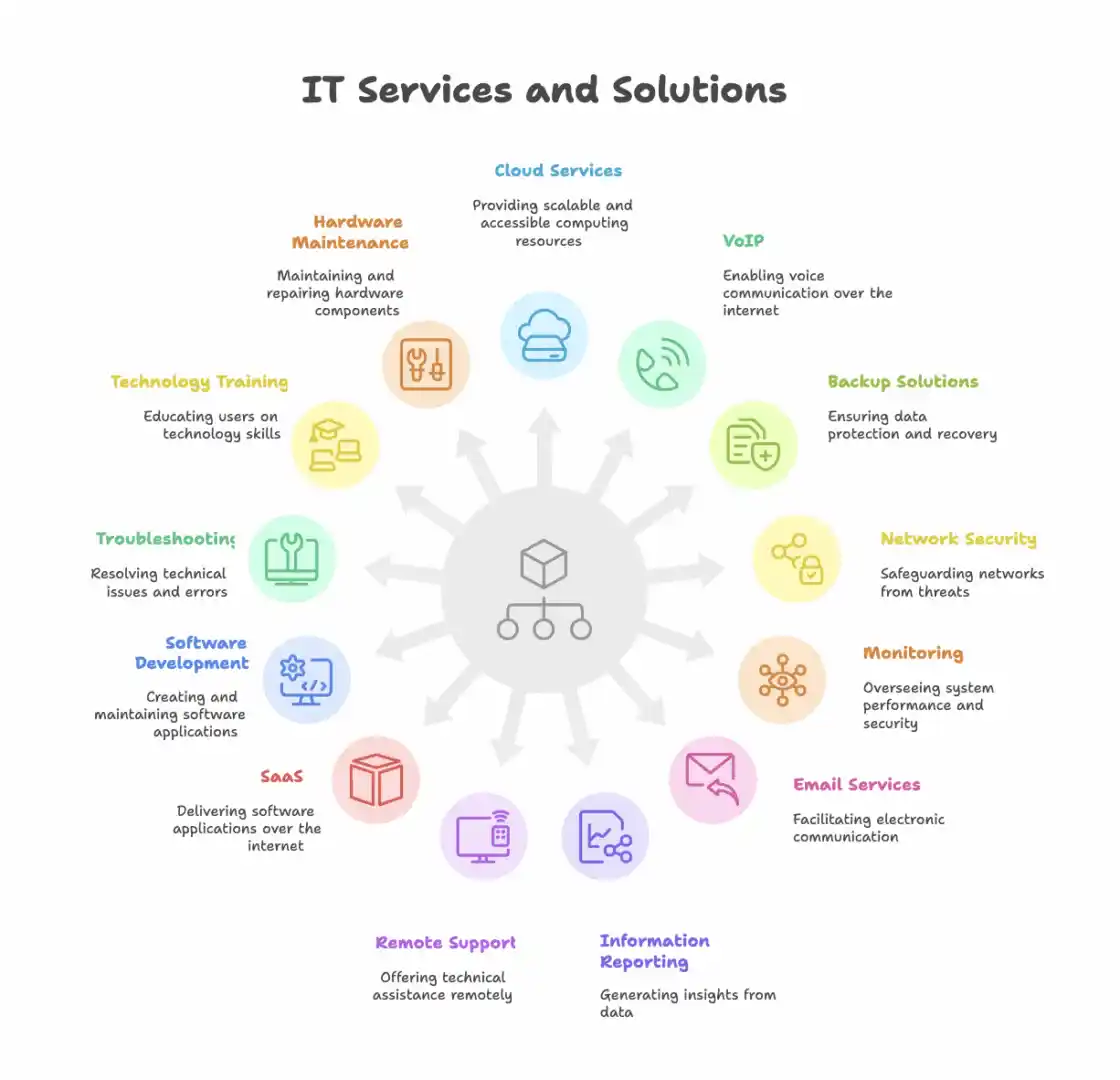Table of Contents
Types of IT Services encompass a wide array of offerings crucial for modern business operations.
These services facilitate access to essential technical tools and information necessary for daily tasks across various industries.
Typically managed by teams proficient in IT or computer science, they cater to diverse organizational needs.
Depending on the business type, IT services may be managed internally or outsourced to external teams.

For example, in the medical sector, a hospital’s IT team ensures the smooth functioning of databases vital for operational efficiency.
In smaller enterprises, IT services might include provisions such as online data storage and robust network security to safeguard online transactions.
The versatility and indispensability of Types of IT Services underscore their role in enhancing productivity, efficiency, and security across different business environments.
Types of IT Services
Numerous IT services empower businesses, facilitating seamless and efficient operations. These services enable employees to engage with technology for task execution and internal communication.
As many leaders often reflect through impactful business quotes, the right technology choices can define the pace and success of an organization—turning IT services into strategic assets rather than just operational tools.
Among the prevalent ones are network infrastructure management, cloud computing solutions, cybersecurity measures, data backup and recovery services, and IT support for hardware and software issues
By leveraging these IT services, businesses can streamline their workflows, enhance collaboration among teams, and ensure the reliability and security of their technological infrastructure, thereby driving productivity and growth.

1. Cloud services
Cloud services revolutionize the way business teams engage with technology, offering various solutions under the umbrella of “Types of IT Services.”
Essentially an internet-connected platform, the cloud serves as a repository for storing and accessing data and applications.
Unlike traditional computing methods, where data resides on individual computers, the cloud enables seamless access from anywhere, home or the office.
This accessibility empowers team members to utilize resources remotely also by hiring a programmer without geographical constraints.
Furthermore, certain cloud services facilitate the remote operation of entire operating systems, granting users access to internal business programs without the need for local installations.
By leveraging cloud solutions within the “Types of IT Services spectrum,” businesses optimize efficiency and flexibility while transcending conventional boundaries, fostering a collaborative and dynamic work environment that adapts to the modern digital landscape.
2. Voice over Internet Protocol (VoIP)
“Voice over Internet Protocol (VoIP) is a crucial communication tool within the realm of Types of IT Services.
It revolutionizes business communication by enabling team members to make calls and send messages over the Internet, bypassing traditional phone lines.
Unlike a typical cell or landline service, VoIP offers greater flexibility and cost-efficiency for modern organizations.
This VoIP Solutions technology facilitates seamless internal long-distance communication,particularly beneficial for businesses with multiple offices.
Offering flexibility and cost-effectiveness, VoIP services often require subscriptions, providing businesses with versatile options to integrate them alongside traditional phone services or as standalone alternatives, enhancing connectivity and collaboration across geographically dispersed teams.
Many businesses also explore voip calling services to further optimize their communication infrastructure with reliable and scalable solutions.
3. Backup solutions
“Types of IT Services encompass various backup solutions crucial for safeguarding data integrity.
These services prevent data loss by creating duplicate copies stored on external hardware or cloud platforms.
Whether it’s file, server, or desktop backup, businesses can mitigate risks from power outages or system failures.
Automatic scheduling ensures the latest file versions are securely preserved, offering peace of mind and uninterrupted operations.”
4. Network security
Types of IT Services encompass a broad range of crucial functions, including network security, network routing and switching.
These services play a pivotal role in safeguarding businesses against unauthorized access.
They meticulously craft access authorizations, erect robust firewalls, deploy anti-virus software, and set up virtual private networks (VPNs).
Furthermore, these IT experts conduct routine network checkups to ensure optimal security posture.
With their arsenal of protective measures, Types of IT Services fortify your network’s defenses, providing peace of mind and enabling uninterrupted operations.
5. Monitoring
Types of IT services encompass comprehensive network monitoring capabilities, overseeing internet traffic, computer systems, and all internet-enabled devices.
This vigilant surveillance enables IT teams to maintain a firm grasp on data access within their organization, promptly identify any technology malfunctions requiring repair, and ensure timely software updates or modifications for optimal performance.
By deploying this robust IT service, businesses empower their teams with the necessary tools and resources, fostering a conducive environment for seamless task completion and sustained productivity.

6. Email services
Businesses and organizations heavily depend on email for diverse communication needs, spanning individual correspondence, company-wide announcements, and customer relations.
IT teams play a crucial role in managing email accounts and advising on service providers that align with organizational requirements.
These IT email services not only streamline internal communication but also enhance sales and marketing efforts by facilitating seamless interactions with customers and leads.
Leveraging various types of IT services, businesses ensure efficient email management and foster strong, productive relationships across departments and with external stakeholders.
7. Information reporting
Through robust data collection and monitoring, various Types of IT Services offer insightful reports crucial for organizational growth.
These reports cover diverse topics, from technology usage to data storage efficiency, empowering businesses to gauge their current service effectiveness.
Leveraging specialized software, IT services streamline financial and project reporting. This can involve analyzing internal data or gathering external market intelligence through automated tools like the best web scraping APIs, which helps optimize operational workflows and strategic decisions.
These information reporting services organize data in user-friendly formats, facilitating better comprehension of business dynamics and informed decision-making.
With a focus on data-driven insights, Types of IT Services play a pivotal role in enhancing organizational efficiency and strategic planning.
8. Remote support
In the realm of IT services, remote support stands as a formidable asset. When encountering technical hiccups, swift resolution is imperative.
With remote capabilities, IT services transcend physical barriers, swiftly accessing and resolving issues across a spectrum of devices, including mobile ones.
This dynamic feature expedites application updates and rectifies errors with unparalleled efficiency, ensuring seamless workflow continuity.
Embracing IT services equipped with remote support capabilities empowers businesses to minimize downtime, maximizing productivity and operational resilience.
Explore the transformative potential of such “Types of IT Services” to elevate your digital infrastructure.
9. Software as a service
Types of IT Services encompass a range of solutions, including Software as a Service (SaaS), which entails subscription-based access to programs like word processing and databases.
These services not only connect you to essential tools but also ensure seamless functionality through monitoring and technical support.
SaaS often includes cloud access, enabling remote work on various devices.
Businesses benefit from additional IT service features bundled with SaaS subscriptions, enhancing efficiency and reliability.
Embrace the power of Types of IT Services to streamline operations and empower your team with cutting-edge software solutions.

10. Software development
Types of IT services encompass a broad spectrum, including software development tailored to unique business requirements.
For instance, startups might leverage IT teams to craft customized applications like venture capitalist record management software.
These services ensure the development of personalized software, guaranteeing its effectiveness through rigorous testing, ongoing development, and consistent maintenance.
Whether it’s streamlining operations or enhancing productivity, IT services offer dynamic solutions to address specific organizational needs.
11. Troubleshooting and technical support
Types of IT Services encompass a broad spectrum, including technical support and troubleshooting for software applications, programs, and online tools.
These services are pivotal for organizations, guiding users in resolving technical errors and suggesting necessary steps, like sending devices for repairs.
With dedicated technical support, organizations ensure swift resolution of staff queries or challenges in utilizing company software, fostering seamless operations.
This comprehensive assistance underscores the importance of robust IT services in maintaining efficiency and productivity across various organizational functions.
12. Technology training
Types of IT Services encompass crucial technology training initiatives aimed at optimizing team efficiency.
With rapid advancements in technology and software, empowering your team with updated devices and software proficiency ensures seamless operations.
IT services offer comprehensive training programs tailored to your business needs, equipping staff with the skills to navigate specific tools, programs, and applications efficiently.
By embracing these training opportunities, your company fosters a culture of continuous learning and technical excellence, driving productivity and success in today’s dynamic digital landscape.
13. Hardware installations and maintenance
In addition to software solutions, various hardware installations, maintenance, and repairs are integral components of many business IT services.
As exemplified by corporate IT departments, responsibilities often encompass setting up essential hardware such as computers, UV printers, modems, and routers crucial for operational functions.
Technical teams assess the company’s workflows to identify hardware requirements aligning with its objectives.
Regular maintenance ensures optimal performance, with updates and upgrades executed to enhance productivity.
These hardware-related tasks are fundamental elements within the expansive realm of “Types of IT Services,” ensuring seamless technological support for organizational success.